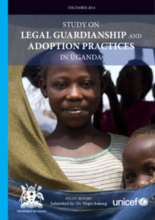This study on legal guardianship and adoption practices in Uganda was designed to explore and get insight into current care practices. The study includes both a desk review and a research component, consisting of interviews with key informants (including law firms, birth parents and family members, probation and social welfare officers, child care institutions, adoptive parents, judges, and local council chairs at the village level).
The study found that, while laws on adoption are clear, there are few legal procedures and protocols to govern the use of legal guardianship, in particular legal guardianship for purposes of intercountry adoption. The study also notes that the relinquishment of parental rights for intercountry adoption is connected to the “misconception that foreign adoptive parents have a great deal of resources to take care of the child as well as support the birth family” and “is also influenced by financial incentives from adoptive parents and children’s homes.” Furthermore, the study found the presence of fraud in some adoption and legal guardianship practices.
The report concludes with recommendations, including ratifying the Hague Convention on Intercountry Adoption, developing mechanisms for oversight of intercountry adoption, temporarily suspending the use of legal guardianship for purposes of adoption, continuous public education on adoption and legal guardianship, and more.

